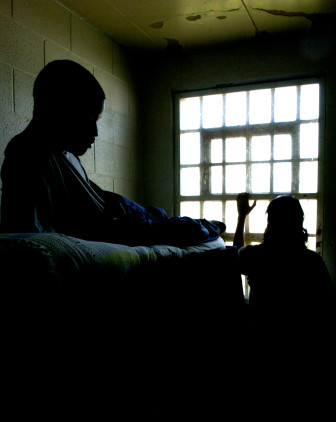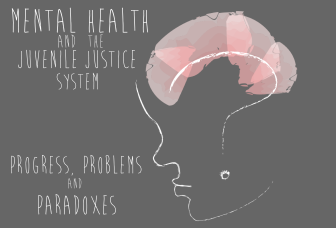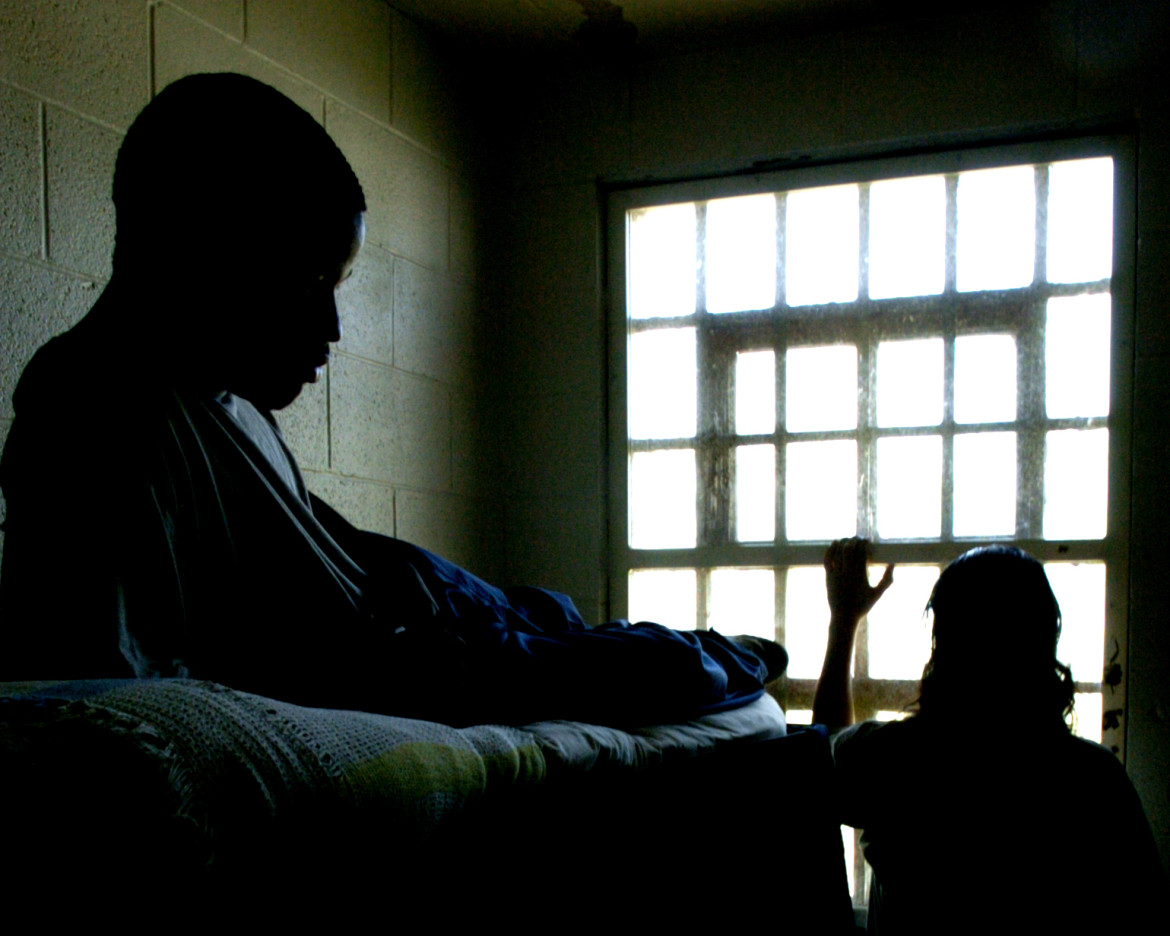
Antonio Perez/Chicago Tribune/MCT
Youths inside their confinement rooms at the Illinois Department of Juvenile Justice Center.
The Illinois Department of Juvenile Justice and the American Civil Liberties Union have reached agreement on a comprehensive remedial plan to address the issues first raised in a September 2012 lawsuit and confirmed in a December 2012 consent decree signed by both parties.
The plan to reform how the department handles mental health, confinement, community placement, safety issues and education services, approved by U.S. Judge Matthew Kennelly on April 7, is the latest step forward in the resolution of the lawsuit RJ vs. Bishop. Many of the specific provisions were informed by a series of expert reports that were made public last September and addressed numerous systemic deficiencies.
For example, the psychiatric and mental health report, authored by Dr. Louis J. Kraus of Northrbrook, Ill., stated that the department lacked a full complement of services, the security necessary to provide such services and a regular time-frame over which to provide them.
“No matter how many groups are described as evidence-based, and no matter how much support is being described for these groups, they are not actually functioning consistently,” Kraus wrote, based on site visits to all six Illinois Youth Center facilities, visual inspections, confidential interviews and document reviews. “The reality is that many of these youth are not getting the mental health support they need.”
The remedial plan spells out numerous staff positions that IDJJ will need to either add, upgrade or fill, as well as policy changes covering areas like mental health records, individual treatment plans, medication consent, immediate requests for mental health care and special issues related to LGBTQ care.
Attorneys for both sides said they believe the remedial plan — and the ongoing review from Kennelly, which he asked to have formally added to the plan — will address the issues raised in the initial ACLU lawsuit from 2012 as well as the expert reports from 2013.
“It’s a great thing. There are 18 paragraphs that call for implementation of policies, and all policies have to go to the judge for his review,” said Adam Schwartz, lead attorney for the ACLU. “The plan says there are required staffing levels and required service levels. The department has to meet that. The plan has a schedule.”
The required staff-to-youth ratios can be met one of two ways, Schwartz said. “You can change the numerator or you can change the denominator,” he said. “We are hopeful that the number of youth locked up continues to drop.”
The ACLU doesn’t know specifically how many new positions will need to be filled or what the added expenditures might be, said Lindsay Miller, staff attorney. “What we’ve done in creating this plan is to set up enforceable ratios and a plan to develop staffing ratios,” she said. “Certain of these positions are important and needed, in order to ensure that facilities are providing minimally adequate services in order to comply with the constitution.”
The IDJJ looks forward to moving forward with the remedial plan, said Alka Nayyar, department spokeswoman. “We certainly have work to do, and I think it’s important to note that we want to make sure that the department and our staff have the resources and support to meet the requirements ahead,” she said.
IDJJ didn’t necessarily agree with every dotted “I” and crossed “T” in the expert reports, said Beth Compton, general counsel. “There were certainly, as with any analysis where you’ve got someone external coming to do visits, and for, relatively speaking, short periods of time … there are always things you have to go back and clarify and discuss further,” she said. “We certainly had those kinds of conversations, which led to the remedial plan, which all parties agreed addressed the specific concerns.”
IDJJ has begun conversations with the state legislature about additional resources that would be needed to fill or create new positions and otherwise comply with the remedial plan, although the department hasn’t calculated a precise number of full-time equivalent line-items or a dollar amount to pay for them, Compton said. The department has until 2017 to meet some of the requirements and plans to phase in changes; step one will be the security staffing needed, which IDJJ is incorporating into its budget request for FY 2015, she said.
“There are a lot of things in the remedial plan that weren’t necessarily new positions,” Compton said. “Or we may already have had budgetary capacity, and it’s just a matter of creating the positions. It’s really a mix of needed new positions, filling existing positions, which includes already budgeted headcount, and reducing the [youth] population.”
The department already had been moving forward on some of the policy-related changes contained in the remedial plan, Compton said. “We’ve been prepared for quite some time,” she said. “Certainly there are challenges with reform, such as implementing training, and this is not to suggest that this is an easy process. But we’re prepared for it.”
Mental Health Services
The mental health stipulations in the plan specify at least eight staffing positions: a licensed physician medical director who will oversee health care services at all facilities, a board-certified child and adolescent psychiatrist who will oversee psychiatric services in all facilities, and treatment unit administrators at each of the six Illinois Youth Center facilities, who will have a minimum of a PhD or PsyD degree as well as state licensure. IDJJ has 180 days to fill each of these positions.
Within 90 days of hiring the medical director and psychiatrist, the department is required to “establish appropriate staffing levels and qualifications of mental health professionals to deliver individual and group therapy based on youths’ diagnostic needs and services called for in each youth’s individualized mental health treatment plan,” the remedial plan says. The psychiatric staffing hours must ensure that services comply with established standards, such as initial evaluations of at least 90 minutes per patient and follow-up assessment of at least 30 minutes.
 The plan also requires the department to implement policies around timely hospital admissions of those with significant mental health needs, forms to ensure that appropriate informed consents are given before psychotropic medications are administered, and development and implementation of individualized mental health treatment plans for each youth that can include family therapy when appropriate. Lastly, the department must revise policies to ensure that LGBTQ youths are protected from harassment and provided individualized decision-making around issues like where—with which gender—transgender youth should be housed.
The plan also requires the department to implement policies around timely hospital admissions of those with significant mental health needs, forms to ensure that appropriate informed consents are given before psychotropic medications are administered, and development and implementation of individualized mental health treatment plans for each youth that can include family therapy when appropriate. Lastly, the department must revise policies to ensure that LGBTQ youths are protected from harassment and provided individualized decision-making around issues like where—with which gender—transgender youth should be housed.
Compton said the remedial plan called for certain positions that aren’t entirely new for the department. For example, individual facilities previously had treatment unit administrators. “It’s just a matter of making them uniform in each facility, with the qualifications,” she said. “In some cases [the positions] weren’t filled, in some cases we didn’t require the same qualifications.”
Miller, of the ACLU, noted that the expert report had identified the provisions in the plan “as things that weren’t happening. Whether or not they should have been, ahead of time, the experts identified that they weren’t happening, and we believe they should be now. Having them emphasized in this plan is an effort to ensure those things will occur.”
For example, Miller said the plan will require that each youth has his or her own mental health plan and will receive adequate services. And when they need services on the spur of the moment, the department will need to do its best. “For a variety of reasons you might ask to speak with a mental health professional; we believe those requests should be honored or promptly attended to, to the extent reasonably possible,” she said, adding that if it’s 3 a.m., that might not be reasonably possible.
Confinement
The remedial plan addresses another issue that can be closely related to mental health: confinement and restricted movement. Under the agreement, the IDJJ has 180 days to rewrite its policy to include provisions that youths must not be confined for more than 24 hours for behavioral reasons and will be limited only to those who exhibit “aggressive or uncontrolled behavior or movement.”
The agreement also stipulates that youths will be confined for mental health crises only if they present a risk of harm to themselves or others, and no less restrictive environment is available; and they will be re-evaluated every 24 hours by a mental health professional. If confinement is still deemed necessary after three days, they will be evaluated for potential hospitalization.
Within 180 days, the department will establish a youth and family specialist or other non-security staff member to serve as confinement liaison to ensure that appropriate services such as mental health, education and reading materials are provided to youth in confinement.
Miller notes that in the past, confinement has been used for punitive, disciplinary measures. “Some sort of infraction would happen, and youth would be sent to these units for an undetermined period of time. This gets rid of that option. … Once they gain their composure, they’re immediately returned.”
Safety and Other Issues
The remedial plan stipulates a number of other positions and policies. In the education realm, IDJJ will provide full-time, full-day instruction on all scheduled school days, filling additional teacher and support staff positions as necessary. The academic curriculum will cover all subjects in which youth must enroll to earn a high school diploma, and youth receiving special education will be monitored to ensure they are receiving services specified in their IEPs.
“We’re very proud that the plan is going to ensure every day is a full day of school,” Miller said. “It’s going to ensure ratios so that students will thrive in the classroom and benefit when they leave the facility.”
The IDJJ will put into place a comprehensive, evidence-based treatment and rehabilitation model and a department-wide behavioral management system; and it will create individualized youth development plans within 14 days of a youth’s arrival.
The department will increase security staff posts as needed to ensure adequate staffing and establish the appropriate staff-to-youth ratio for youth and family specialists. IDJJ will continue to maintain a youth grievance hotline and has proposed legislation that would create an independent juvenile ombudsman to review implementation of rules.
Compton sees the security staffing as critical to ensuring that other provisions in the plan go forward as intended, which is why IDJJ is addressing it upfront. “All parties agreed that implementing security staffing was a significant need, not only for security purposes but also to facilitate programming needs,” she says. “There used to be times programming could not occur” because of the lack of security. “Depending on the level of the population, we are planning to add headcount for those positions. That has been conveyed to the general assembly, with regard to budgetary pressures.”
The remedial plan also addresses community placement, requiring that within 90 days, IDJJ will assign a placement coordinator to oversee and monitor discharge planning, identifying and resolving placement barriers. The placement process will begin within 14 days of a youth’s confinement. “DJJ shall collaborate with providers to develop and implement a comprehensive model that prepares youths for placement in residential facilities and enhances their prospects for success,” the plan reads.
Lastly, the IDJJ will appoint a deputy director of quality assurance within 180 days to monitor the overall delivery of services and programs to youth, ensure that implementation is consistent with the agency’s objectives and mandates, and help to flesh out and implement statewide policies, procedures, guidelines and performance standards.
The parties will return to Judge Kennelly after 60 days to conduct their next status hearing to review progress to date.
Financial supporters of The JJIE may be quoted or mentioned in our stories. They may also be the subjects of our stories.


If these ACLU clowns want these kids released back in the community so badly why don’t they welcome them into their communities. I’m sure their thoughts on these poor kids will be the same after they come home on the first day and they’ve been robbed blind. They are so concerned about the “trauma” they claim these kids undergo locked up, most of them live better locked up then they do out in the world, but show no concern for the trauma of the victims that these kids have terrorized.
These people need to come spend a week teaching in the school or working security and see the just how mistreated these kids really are. I’m sure after they’ve been cussed out by a kid for the 100th time at the end of day 1 they will still feel the same.
Wow! They forgot to include staff assaults and the corrupt management currently in place! I am sure these professionals spent many years working in maximum security institutions! Not!